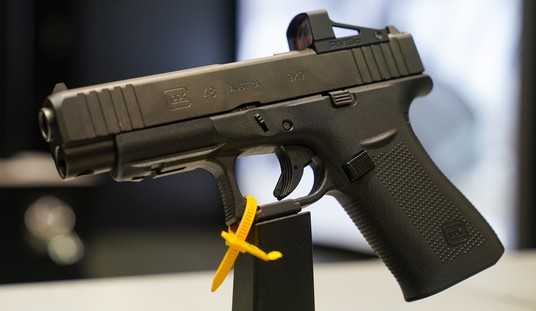Humans tend to be creatures of habit.
Even if you think you’re not, you really are. After all, what happens if you go to bed without brushing your teeth? If you brush right before bed every night, you probably feel a little weird skipping it.
The same is true of most of your other habits. Whatever it is you do on a regular basis is a big chunk of who you are.
When it comes to your guns, you have habits there as well. You lock your guns up every night. You put your holster on every morning. You do things with your guns just like you would with anything else.
And according to one study, there’s supposedly a problem.
A recent study by the New Jersey Gun Violence Research Center at Rutgers is providing fresh insights into how firearm owners across different states handle and use their weapons.
While studies have shown that having a gun at home can elevate the risks of injuries or fatalities, much of the existing research has been too generalized, often focusing on national samples. This has resulted in a limited understanding of the contrasts between firearm-owning communities across the country.
…
The research team from Rutgers examined data from a diverse set of states – New Jersey, Minnesota, Mississippi, Colorado, and Texas. These states were selected for their significant differences in geography, politics, culture, gun policies, and rates of firearm-related violence.
In terms of firearm use, Mississippi and Texas stood out for riskier behaviors. Owners from these states more frequently stored loaded guns, carried firearms outside their homes, and in Mississippi, often stored them openly in vehicles. These states are known for their relaxed firearm regulations. Conversely, in New Jersey, where gun regulations are stricter, the use of gun safes is more common. Minnesota differed again, with firearm owners more inclined towards rifles and shotguns, and primarily citing hunting as their primary reason for ownership. In contrast, the main reason in all other states was home safety.
Now, that’s a lot of information they’re talking about here, so one is forced to wonder how they got it. That’s why you need to always look at the study itself and not just the press release on the study.
So, that’s what I did.
All this information is based on a self-report survey in which around 3,500 people responded. This is an issue for a variety of reasons.
The first is that the sample pool is…interesting.
Yes, there are two pro-gun states and three anti-gun states, yet it seems deliberate to include Mississippi but not, say, New Hampshire or Wyoming, both of which are pro-gun states with very low homicide rates, unlike Mississippi.
Funny, that. Especially as it might skew some habits for some folks.
It doesn’t mean there is a problem inherently with including Mississippi, but the abstract doesn’t actually give any reason why that particular state was included.
Regardless, 3,500 people sounds like an awfully small sample size. Texas alone has nearly 10 million households, more than 35 percent of which have a gun. That’s nearly 3.5 million households in just that one state. That seems like an awfully small percentage whose habits are intended to represent a whole lot of people.
Then we have a problem with self-report surveys.
The reliability of self-report data is an Achilles’ heel of survey research. For example, opinion polls indicated that more than 40 percent of Americans attend church every week. However, by examining church attendance records, Hadaway and Marlar (2005) concluded that the actual attendance was fewer than 22 percent. In his seminal work “Everybody lies,” Seth Stephens-Davidowitz (2017) found ample evidence to show that most people do not do what they say and do not say what they do. For example, in response to polls most voters declared that the ethnicity of the candidate is unimportant. However, by checking search terms in Google Sephens-Davidowitz found the otherwise. Specifically, when Google users entered the word “Obama,” they always associated his name with some words related to race.
For research on Web-based instruction, web usage data may be obtained by parsing the user access log, setting cookies, or uploading the cache. However, these options may have limited applicability. For example, the user access log cannot track users who follow links to other websites. Further, cookie or cache approaches may raise privacy issues. In these situations, self-reported data collected by surveys are used. This gives rise to the question: How accurate are self-reported data? Cook and Campbell (1979) have pointed out that subjects (a) tend to report what they believe the researcher expects to see, or (b) report what reflects positively on their own abilities, knowledge, beliefs, or opinions. Another concern about such data centers on whether subjects are able to accurately recall past behaviors. Psychologists have warned that the human memory is fallible (Loftus, 2016; Schacter, 1999). Sometimes people “remember” events that never happened. Thus the reliability of self-reported data is tenuous.
In this case, we may be looking at a difference in cultural values leading to people telling different stories to researchers about their habits.
For example, in Texas and Mississippi, people are more likely to have guns for self-defense and that concept be accepted by their peers. So, they are less hesitant to acknowledge carrying a firearm in a survey or admitting to having a gun generally unsecured at home. After all, if you need a gun for self-defense, it doesn’t do you a lot of good if it’s back home in the safe.
You need to be able to access it.
Then you have the people who aren’t going to respond to a survey like this at all because they’re just not trusting enough that the survey will really be anonymous, which is true of a lot of your die-hard gun people. As a result, you’re most likely to get the neophyte gun owners–people who may not understand how to keep a weapon secured–or who think it’s only secured if it’s locked up, which the researchers may have also meant if we’re being honest–and still be able to access it in an emergency.
On the flip side, in anti-gun states, gun owners might be used to only admitting to hunting weapons and be conditioned to only respond with just how securely stored those guns are, all while pretending they don’t have a handgun in the nightstand. They might lie about those habits because they’re conditioned to lie about them.
So while I’m sure this study will start making the rounds soon, it’s a prime example of just how bad anti-gun studies actually are.








Join the conversation as a VIP Member